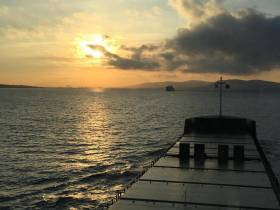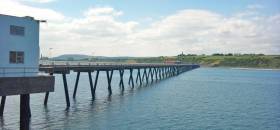Displaying items by tag: Cloghan Point
Council Planners Approve Cloghan Point Oil Terminal Expansion Despite Sizeable Local Opposition
Mid and East Antrim Borough Council’s planning committee have approved for expansion of a Belfast Lough oil terminal despite sizeable local opposition to the project, as BBC News reports.
Cloghan Point has four large tanks which are currently used to store part of the Republic of Ireland’s strategic reserve of diesel and gas oil.
But plans since 2019 to upgrade the site to a major distribution hub in a £30 million expansion have raised the ire of residents in the nearby village of Whitehead, Co Antrim.
Local campaigners argued that the proposals pose a threat to marine wildlife in that part of Belfast Lough’s northern shore, as well as the train line between Larne and Belfast.
More than 400 letters opposing the project were submitted to the council, whose head of planning says the scheme has been “adequately assessed” by the Northern Ireland Environment Agency and will "not have an adverse impact" on the area.
BBC News has more on the story HERE.
Residents Oppose Expansion of Oil Facility At Cloghan Point
Along the shores of Belfast Lough, people living in the area have said they cannot understand the logic for the expansion of an oil facility that would see large tankers offloading fuel several times a month.
The £20m project, reports BBC News NI, would see the redevelopment of the Cloghan Point facility near Whitehead.
The company behind it said it would create jobs and deliver cheaper fuel.
The site was built in the late 1970s to serve Ballylumford and Kilroot Power stations.
It did this for several years.
But, in more recent times, the four large tanks have been used to store part of the Republic of Ireland's strategic reserve of diesel and gas oil.
Local people said that meant it was a static site with little activity.
To read much more click here and for TV coverage (click arrow on first photo).
Locals in Whitehead, Co Antrim have been vocal in their opposition to plans that would see the oil terminal at Cloghan Point upgraded to a large-scale distribution hub, as Belfast Live reports.
LCC Group, the company behind the Go petrol station network, says it wants to make the most of the site’s deep water jetty — which can accommodate tankers of up to 120,000 tonnes — by developing a £20 million distribution and storage terminal for the island of Ireland.
Its plans are currently before Mid & East Antrim Borough Council for assessment.
However, Whitehead community campaigners say the proposals pose a threat to wildlife in that part of Belfast Lough’s northern shore, as well as the “life line” train line between Larne and Belfast — a concern shared by rail operators Translink.
Belfast Live has much more on the story HERE.































































